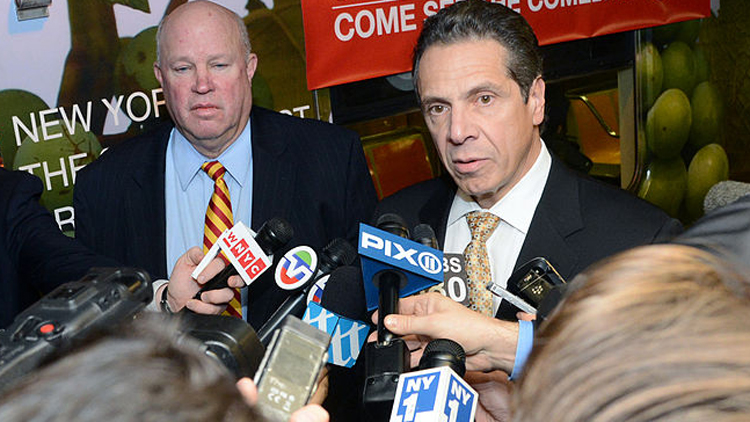When New York Gov. Andrew Cuomo took office, he promised to operate “the most transparent” administration in history. The night of his victory, he said, “The people want a government of competence and performance and integrity.”
But just last week, New York State instituted a new email deletion policy that automatically purges government emails after 90 days. It’s the latest in a long line of decisions that seem to contradict Cuomo’s promise.
August 15, 2011 – Cuomo responds to a request for flight records with black ink.
The administration’s FOIL Lawyer meets a reporter’s request for information on the use of the State’s Police Aviation unit with documents so full of redactions that the Albany Times-Union wrote it is ” impossible to understand why someone used planes or helicopters during the governor’s first six months in office.”
August 15, 2011 – Governor signs a toothless ethics reform Act.
The Public Integrity Reform Act, previously named the Clean Up Albany Act, requires greater disclosures of campaign and business finances as well as meetings between firms and any elected officials. But its new Governor and lawmaker-appointed enforcement panel created as part of the law called the Joint Commission on Public Ethics is criticized in a New York Times editorial as ” so deeply flawed in its structure as to be wholly ineffective.”
July 16, 2012 – Gov. Cuomo uses BlackBerry messaging system to avoid a paper trail.
The New York Daily News reports on the Governor’s use of Blackberry’s messaging system to communicate with his “inner circle” as to avoid a paper trail that comes with using email.
June 30, 2013 – Governor adopts a new email retention policy that erases correspondence after 90 days.
The Albany Times-Union reports the state’s new email system would purge all messages after 90 days unless they are individually marked to be saved.
May 5, 2014 – Cuomo aides are using personal email accounts for government business.
ProPublica reports that aides to Gov. Cuomo are using private email accounts to conduct government business, including Howard Glaser, a top Cuomo adviser at the time. This may violate a state policy which prohibits state employees from using “a personal email account to conduct State business unless explicitly authorized.” The administration later denies using private emails for government business.
July 23, 2014 – Cuomo hinders Moreland Commission’s efforts to root out misconduct.
A New York Times investigation finds that the governor’s office scuttled the ethics commission’s pursuits of corruption when they involved entities with close ties to Cuomo. The Commission had been established in July 2013 to aggressively investigate cases of government misconduct that could reach litigation by the Attorney General.
August 11, 2014 – State issues 118-page policy on how to save emails.
As ProPublica writes, the 118-page long email policy is so “bewilderingly complex” that it leads to ” further concern that emails may not be saved at all.”
October 14, 2014 – Cuomo administration refuses to share further details on fundraising.
The Cuomo administration delays its response to a public records request from Capital New York for documents detailing some of the governor’s fundraising efforts. The administration denies the request six months after it was submitted arguing that any documents not posted online to the Governor’s pre-edited public schedule “are simply drafts meant for internal use” and exempt from disclosure under Freedom of Information laws, according to a report by Capital New York.
February 25, 2015 – The administration begins purging emails under new policy.
The State fully implements its email deletion policy that automatically deletes all emails at several state agencies older than 90 days.
February 27, 2015 – Cuomo’s Chief Information Officer grilled over email deletion policy.
Lawmakers at a budget hearing grill Maggie Miller, the State’s Chief Information Officer, over its new policy. When asked pointed questions about the policy’s impact on litigation and Freedom of Information laws, Miller answered, “I, uh, all I can say is I fully support the policy.”
ProPublica is a Pulitzer Prize-winning investigative newsroom. Sign up for their newsletter.




























